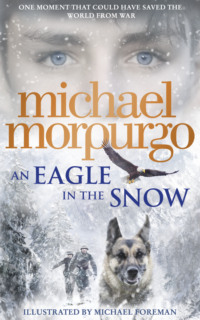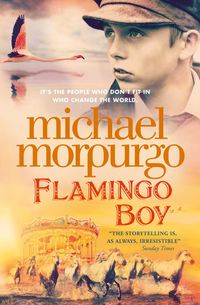
Полная версия
Morpurgo War Stories
“Tommy?”
It was her, the girl from the estaminet. She was carrying out a crate of wine bottles.
“You are ill?” she asked me.
Tongue-tied, I shook my head. We stood for some moments listening to the thunder of the guns as a heavy barrage opened up over Wipers, the sky lit up over the town like an angry sunset. Flares rose and hovered and fell over the front line.
“It is beautiful,” she said. “How can it be beautiful?”
I wanted to speak, but I did not trust myself to do so. I felt suddenly overwhelmed by tears, by longing for home and for Molly.
“How old?” she asked.
“Sixteen,” I muttered.
“Like me,” she said. I found her looking at me more closely. “I have seen you before, I think?” I nodded. “I will see you again perhaps?”
“Yes,” I said. Then she was gone and I was alone again in the night. I was calmer now, more at peace with myself and stronger, too. Walking back to camp I made up my mind. We were being sent away for training the next day, but as soon as I came back, I would go straight to Pop, to the estaminet, and when the girl brought me my egg and chips I would be brave — I would ask her her name.
Two weeks later I was back, and that’s just what I did. “Anna,” she told me. And she tinkled with laughter when I told her my name was Tommo. “It’s true then,” she said. “Every English soldier is called Tommy.”
“I’m not Tommy, I’m Tommo,” I replied.
“It’s the same,” she laughed. “But you are different, different from the others, I think.”
When she heard I had worked on a farm, and with horses, she took me into the stable and showed me her father’s carthorse. He was massive and magnificent. Our hands met as we patted him. She kissed me then, brushed my cheek with her lips. I left her and walked back along the gusty road to camp under the high riding moon, singing Oranges and Lemons at the top of my voice.
Pete greeted me in the tent with a scowl. “You won’t be so ruddy happy, Tommo, when you hear what I’ve got to tell you.”
“What?” I asked.
“Our new sergeant. It’s only Horrible-bleeding-Hanley from Etaples.”
From then on, every waking hour of every day, Hanley was at us. We’d been mollycoddled, he said. We were sloppy soldiers and he was going to lick us back into shape. And we weren’t allowed out of camp until he was satisfied. And of course he was never satisfied. So I couldn’t get out of camp to see Anna again. By the time we went back up into the line, Hanley snapping at our heels, his voice had become a vicious bark inside each of our heads. Every one of us hated him like poison, a great deal more than we had ever hated Fritz.

There is the beginning of day in the night sky, not yet the pale light of dawn, but night is certainly losing its darkness. A cockerel sounds his morning call, and tells me what I already know but do not want to believe, that morning will break and soon.
Morning at home used to be walking with Charlie to school, wading through piles of autumn leaves and stamping the ice in the puddles, or the three of us coming up through the woods after a night’s poaching on the Colonel’s river, and crouching down to watch a badger that didn’t know we were there. Morning here has always been to wake with the same dread in the pit of my stomach, knowing that I will have to look death in the face again, that up to now it may have been someone else’s death, but that today it could be mine, that this may be my last sunrise, my last day on earth.
All that is different about this morning is that I know whose death it will be and how it will happen.
Looking at it that way it seems not so bad. Look at it that way, Tommo. Look at it that way.

I always imagined I’d be lost without Charlie at my side, and the truth is that I might have been had it not been for the new batch of recruits that joined us straight from home. And how we needed them. Almost half of us were missing by this time, killed or wounded or sick. Those of us that were left were to them battle-hardened soldiers, old lags who had seen it all, and therefore to be admired, respected, and even a little feared, it seemed. Young though I still felt, I don’t think I looked it, not any more. Pete and Nipper Martin and I were old soldiers now, and we behaved like it, alternately reassuring the new recruits or terrifying them with our stories, befriending them or teasing them. I think we rather played up to the role they gave us and we revelled in it, too, particularly Pete, who was more inventive with his stories than Nipper and me. All this gave me less time to dwell on my own fears. I was far too busy pretending I was someone else.
For some time, life was about as quiet as it could get in the front line. We and Fritz did little more than irritate each other with occasional whizzbangs and night patrols, and in the close confinement of the dugout and the trenches even Sergeant Hanley could do little to make our lives any more of a misery than they already were, though he still did his very best, with an endless succession of inspections and consequent punishments. But for days on end the guns stayed silent, the spring sun shone, warming our backs and drying out the mud. And best of all, we went to bed dry — a rare treat, a miraculous treat. Yes, the rats were still there and the lice loved us as much as ever, but this was a picnic compared to all we’d been through before.
By now I think the new recruits were all beginning to think that we old lags had been exaggerating with some of our harsher tales of trench warfare. Boredom and Sergeant Hanley seemed to them to be the worst they had had to endure so far. And it was certainly true, particularly in Pete’s case, that we had laid it on a bit thick. But Pete, like the rest of us, had, for the most part anyway, told them stories that had at least some connection with the truth. None of us, not even Pete, could have imagined or invented what would happen to us on the quietest of May mornings, when we were least expecting it.
Stand-to on the firestep at dawn had been normal, by now a mere routine, and an annoying one too. Attacks came mostly at dawn, we knew that, but after all this time we expected nothing to happen, and nothing had happened, not for a long while now. We were lulled by the blue skies perhaps, or by sheer boredom. Fritz seemed to have gone to sleep on us and as far as we were concerned that suited us fine. We thought we could go to sleep too. The awakening came suddenly. I was in the dugout, and I was just beginning a letter home.
I am writing to Mother — I haven’t written for a while and am feeling guilty about it. My pencil keeps breaking and I am sharpening it again. Everyone else is lying asleep in the sun or is sitting about smoking and chatting. Nipper Martin is cleaning his rifle again. He’s always very particular about that.
“Gas! Gas!”
The cry goes up and is echoed all along the trench. For a moment we are frozen with panic. We have trained for this time and again, but nonetheless we fumble clumsily, feverishly with our gas masks.
“Fix bayonets!” Hanley’s yelling while we’re still trying frantically to pull on our gas masks. We grab our rifles and fix bayonets. We’re on the firestep looking out into no-man’s-land, and we see it rolling towards us, this dreaded killer cloud we have heard so much about but have never seen for ourselves until now. Its deadly tendrils are searching ahead, feeling their way forward in long yellow wisps, scenting me, searching for me. Then finding me out, the gas turns and drifts straight for me. I’m shouting inside my gas mask. “Christ! Christ!” Still the gas comes on, wafting over our wire, through our wire, swallowing everything in its path.
I hear again in my head the instructor’s voice, see him shouting at me through his mask when we went out on our last exercise. “You’re panicking in there, Peaceful. A gas mask is like God, son. It’ll work bloody miracles for you, but you’ve got to believe in it.” But I don’t believe in it! I don’t believe in miracles.
The gas is only feet away now. In a moment it will be on me, around me, in me. I crouch down hiding my face between my knees, hands over my helmet, praying it will float over my head, over the top of the trench and seek out someone else. But it does not. It’s all around me. I tell myself I will not breathe, I must not breathe. Through a yellow mist I see the trench filling up with it. It drifts into the dugouts, snaking into every nook and cranny, looking for me. It wants to seek us all out, to kill us all, every one of us. Still I do not breathe. I see men running, staggering, falling. I hear Pete shouting out for me. Then he’s grabbing me and we run. I have to breathe now. I can’t run without breathing. Half-blinded by my mask I trip and fall, crashing my head against the trench wall, knocking myself half-senseless. My gas mask has come off. I pull it down, but I have breathed in and know already it’s too late. My eyes are stinging. My lungs are burning. I am coughing, retching, choking. I don’t care where I’m running so long as it is away from the gas. At last I’m in the reserve trench and it is clear of gas. I’m out of it. I wrench off my mask, gasping for good air. Then I am on my hands and knees, vomiting violently. When at last the worst is over I look up through blurred and weeping eyes. A Hun in a gas mask is standing over me, his rifle aimed at my head. I have no rifle. It is the end. I brace myself, but he does not fire. He lowers his rifle slowly. “Go boy,” he says, waving me away with his rifle. “Go. Tommy, go.”
So by the whim of some kind and unknown Fritz I survived and escaped. Later, back at our field hospital I heard that we had counterattacked, and had driven the Germans back and retaken our frontline trenches but, from what I could see all around me, it was at a terrible cost. I lined up with the rest of the walking wounded to see the doctor. He washed out my eyes, examined them, and listened to my chest. Despite all my coughing he pronounced me fit. “You’re lucky. You can only have got a whiff of it,” he said.
As I walked away I passed the others, those that had not been as lucky. They were lying stretched out in the sun, many of them faces I knew, and would never see again; friends I had lived with, joked with, played cards with, fought with. I looked for Pete amongst them. He was not there. But Nipper Martin was, the last body I came to. He lay so still. There was a green grasshopper on his trousers. When I got back to rest camp that evening I found Pete alone in the tent. He looked up at me, wide-eyed, as if he had seen a ghost. When I told him about Nipper Martin he was as near to tears as I’d ever seen him. We exchanged our escape stories over a mug of hot sweet tea.
When the gas attack came, Pete had run like me, like most of us, but with some of the others he had then regrouped in the reserve trench, had been part of the counterattack. “We’re still here, Tommo, we’re alive” he said. “And that’s all that matters I suppose. Unfortunately, so is Horrible-bloody-Hanley. But at least I’ve got some good news for you.” He waved a couple of letters at me. “You’ve got two of them, you lucky devil. No one back home writes to me. Hardly surprising I suppose, because they can’t write, can they? Well, my sister can, but we don’t speak, not any more. Tell you what, Tommo, you can read yours out to me and then I can pretend they’re written to me as well, can’t I? Go on. Tommo. I’m listening.” He lay back, put his hands under his head and closed his eyes. He didn’t leave me much choice.
I have them with me now, my very last letters from home. I tried to keep all the others, but some got lost and others were so often soaked through that they became unreadable and I threw them away. But these I’ve looked after with the greatest of care because everyone I love is in them. I keep them in waxed paper in my pocket, close to my heart. I’ve read them over and over again, and each time I can hear their voices in the words, see their faces in the writing. I’ll read them aloud again now, just as I read them to Pete that first time in the tent. I’ll read Mother’s letter first because I read it first then.
Конец ознакомительного фрагмента.
Текст предоставлен ООО «ЛитРес».
Прочитайте эту книгу целиком, купив полную легальную версию на ЛитРес.
Безопасно оплатить книгу можно банковской картой Visa, MasterCard, Maestro, со счета мобильного телефона, с платежного терминала, в салоне МТС или Связной, через PayPal, WebMoney, Яндекс.Деньги, QIWI Кошелек, бонусными картами или другим удобным Вам способом.








